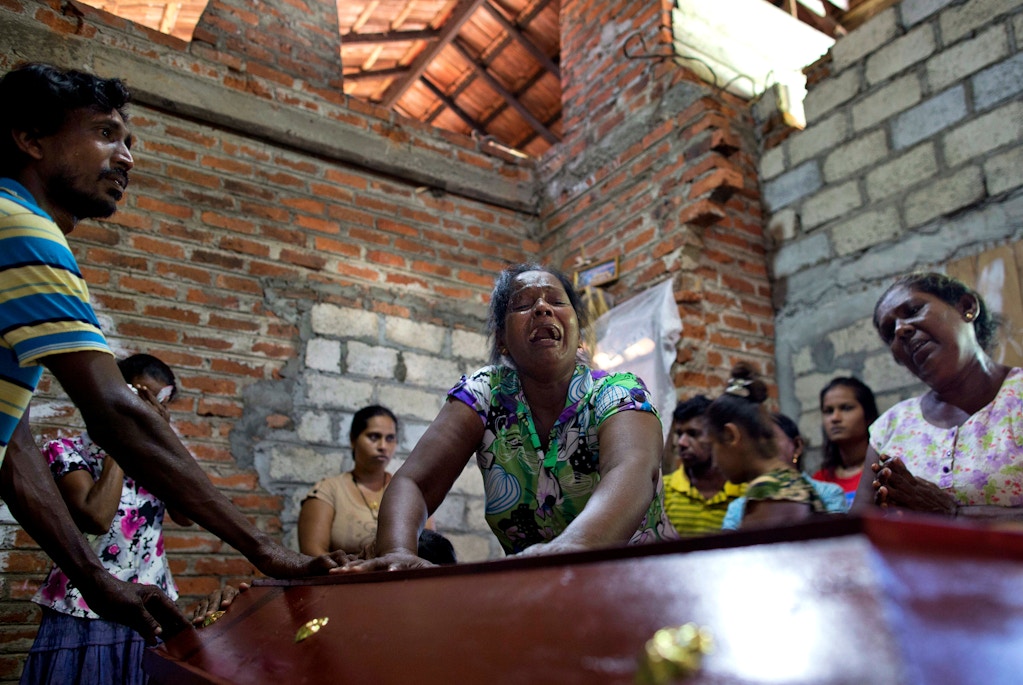Global Issues
Sri Lanka Attack: Why I Am Embarrassed As A Muslim -By Mehdi Hasan

From Christchurch, New Zealand, to Xinjiang, China, there is a war on Muslims. Many of us have spent years writing about it and condemning it. But let’s be clear: From the Middle East to parts of Asia and Africa, there is a war on Christians too.
On Sunday, as Sri Lanka’s minority Christian community celebrated Easter, six suicide bombings struck churches and hotels across the country, killing at least 290 people and injuring more than 500 others. While no one has yet taken responsibility for the blasts, Sri Lankan officials are pointing the finger at a little-known local jihadi group called National Thowheed Jamath.
To call these acts of violence heartless and barbaric would be an understatement. Nevertheless, they aren’t the first such Easter-related attacks on Christians. In Egypt, on Palm Sunday 2017, Islamic State suicide bombers murdered 45 people in two Coptic churches. In Pakistan, in 2016, a suicide bomber affiliated with the Pakistani Taliban targeted Christians celebrating Easter at a public park, killing 75 people. In Nigeria, on Easter Sunday 2012, a suicide bomber believed to be a member of Boko Haram targeted Christians outside a church, killing 38 people.
I am a Muslim, and I consider myself to be on the left, but I’m embarrassed to admit that in both Muslim and left circles, the issue of Christian persecution has been downplayed and even ignored for far too long.
For Muslims, especially those of us living in the West, it simply isn’t an issue we’re comfortable discussing. Perhaps understandably, we don’t want to give the Islamophobes an extra stick with which to beat us. And the fact is that many of those who have raised this particular issue of Muslim-on-Christian persecution in the wake of these latest attacks — such as Republican Sen. Ted Cruz or former British Conservative Foreign Minister Boris Johnson — do have a well-documented history of anti-Muslim bigotry. On Monday, the Washington Post noted how the Sri Lanka attacks are stoking “far-right anger in the West.”
Meanwhile, progressives struggle to see Christianity, the world’s biggest religion, as weak or vulnerable, while prominent Christian leaders here in the West have been associated with great crimes — think George W. Bush, Tony Blair, and the invasion of Iraq. “I do wonder whether on some unconscious level the secular and broadly progressive west thinks that Christianity had it coming,” wrote Giles Fraser, the British priest and social commentator, in the wake of the Sri Lanka bombings on Sunday. “They associate Christianity with popes and their armies, with crusades and inquisitions, with antisemitism, British imperialism, Trump supporters and abortion protesters.”
Fraser, however, conceded that western Christians “haven’t helped” their cause by “describing as ‘persecution’ the minor run-ins that Christianity has had with the law – about cakes for gay couples or street preachers, for example.” Here in the United States, a 2016 poll by the Public Religion Research Institute found that white evangelicals “are more likely to say Christians face a lot of discrimination than they are to say Muslims face a lot of discrimination” — which is palpably absurd.
The situation abroad, however, is another matter. According to a recent study by Pew, Christians do indeed constitute the most persecuted faith community in the world; they are harassed and targeted in 144 countries, with Muslims harassed and targeted in 142 and Jews in 87.
The Christian nonprofit Open Doors publishes an annual World Watch List of the top 50 countries where Christians experience “high levels of persecution.” Here’s what bothers me so much: While communist North Korea (1) is far and away the worst place in the world to live as a Christian, and while anti-Christian attacks are rising fast in Hindu-majority India (10), seven of the top 10 countries in the world where Christians face “extreme persecution” are Muslim-majority countries. In fact, according to Open Doors, “Islamic extremism remains the global, dominant driver of persecution, responsible for initiating oppression and conflict in 35 of the 50 countries on the list.”
On the one hand, it is a smear to suggest that 1.8 billion Muslims
are to blame for the murderous bigotry of a handful of jihadi groups. It
is worth noting that members of Sri Lanka’s minority Muslim community say they warned the Sri Lankan military about National Thowheed Jamath three years ago.

On the other hand, the threat posed to Christians goes far
In Saudi Arabia, churches are banned and Christians cannot practice their faith in public. In a 2016 interview with the New York Times, the country’s Grand Mufti, Abdulaziz al-Sheikh, declared Christianity “not a religion.”
In Indonesia, the world’s biggest Muslim-majority country, where 1 in 10 members of the population is Christian, “hundreds of churches have been forced to close,” reported the New York Times on Sunday, and “proselytizing is banned.” In January, Basuki Tjahaja Purnama, the Christian former governor of Jakarta, was released after serving 20 months in prison on trumped-up charges of blasphemy against Islam.
In Pakistan, the country’s notorious blasphemy laws are used to disproportionately target Christians, who constitute less than 2 percent of the population. Think of Asia Bibi, a Pakistani Christian woman who was sentenced to death for blasphemy and spent almost a decade behind bars before being acquitted in 2018. Or Rimsha Masih, the 11-year-old Pakistani Christian girl with Down syndrome who was also accused of blasphemy and, despite being acquitted, was then forced to flee the country. “Not in my name,” I wrote at the time, referencing the persecution of Pakistan’s Christians by the Muslim majority.Join Our NewsletterOriginal reporting. Fearless journalism. Delivered to you.I’m in
The tragic irony is that the mistreatment of Christians goes against both the diktats of the Quran and the life example of the Prophet Muhammad — it is therefore not just un-Islamic, but anti-Islamic. The Quran reveres Jesus as a major prophet and praises Christians as being among the “People of the Book” who “shall have their reward near their Lord. And they will have no fear, nor will they grieve.”
Prophet Muhammad offered Christians protection from persecution both in his “constitution of Medina” and his “covenant” with the monks of Mount Sinai. More recently, the Marrakesh Declaration, signed by more than 250 Muslim religious leaders, scholars, and heads of state in 2016, declares it “unconscionable to employ religion for the purpose of aggressing upon the rights” of Christians, Jews, and other minority communities in Muslim-majority nations.
But is it too little, too late? In recent decades, millions of Christians have been driven from the Middle East — the birthplace of their faith. This is both a tragedy and a scandal. So, too, is the fact that, according to Open Doors, a “staggering” 11 Christians are killed every single day around the world, on account of their faith.
This shouldn’t be a right vs. left, or Muslim vs. non-Muslim, issue. Many of us, regardless of our faith or our politics, have been



















